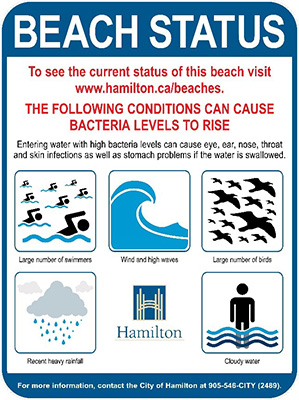Beach Water Quality

Safe Water Hotline 905-546-2189
Email [email protected]

Download, filter or view table of Beach Sampling in Hamilton in open format.
Hamilton Public Health Services monitors the recreational water quality at public beaches each year for levels of E. coli bacteria and Blue-Green Algae (cyanobacteria). Public Health Services monitors beaches annually from the end of May until the end of August.
Beach Water Quality Testing
Public Health services monitors beaches in accordance with the Ministry of Health and Long-Term Care’s Operational Approaches for Recreational Water Guideline 2018 and the Recreational Water Protocol 2018 under the Ontario Public Health Standards. As outlined in the above protocols, beach samples are collected and tested for E. coli bacteria at least once per week during the swimming season.
Beach sampling results cannot be guaranteed accurate as conditions can change quickly depending on the weather. You should not swim at the beach during and after storms, floods or heavy rainfall. Cloudy water may indicate high levels of bacteria.
For more information on ways to stay safe at the beach, visit the Canadian Red Cross’s website.

Beach Status Signs
Public Health Services has upgraded signage at all public beaches. These new signs will help inform community members & visitors in between public health’s routine beach water sampling, of the different conditions that could create potential unsafe water quality conditions.
To report safety hazards at the beach please call 905-546-2489.
Beach Water Quality Test Results
High numbers of E. coli bacteria in the water at public beaches may indicate fecal contamination and the potential presence of other harmful microorganisms.
Using Health Canada’s Guidelines for Canadian Recreational Water Quality, 2012, beaches will be posted as “Unsafe for Swimming” when:
- The geometric mean concentration (minimum of five samples) is greater than 200 E. coli / 100 mL of water; OR
- A single sample maximum concentration is greater than 400 E. coli / 100 mL of water.
Swimming in water with high numbers of E. coli bacteria may increase the risk of ear, eye, nose, throat, and skin infections, as well as gastrointestinal illness (diarrhea) if the water is ingested.
Ingestion of any natural, untreated water used for recreational purposes should be avoided.
Find beach water quality results
To find a beach near you, enter an address into the search box. View map in new window
When a beach is open
- you should swim with caution
- levels of bacteria were within the acceptable range on the date tested
When a beach is unsafe to swim
- E. coli levels are above acceptable levels
- there is an increased risk of illness or infection due to poor water quality
